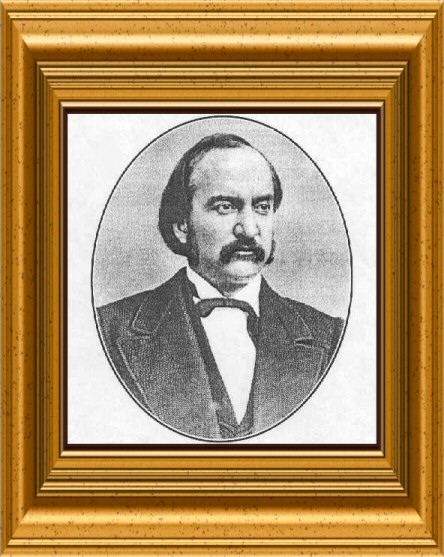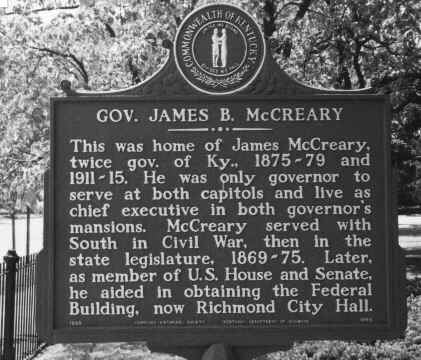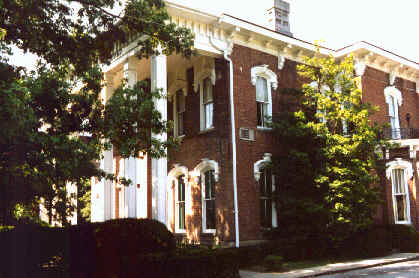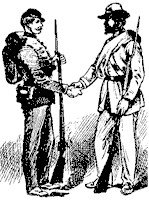Lt. Col. James Bennett McCreary,
"Chenault's" 11th Kentucky Cavalry
Soldier, Statesman, Twice Governor, and Patriot
By Scott K. Williams, 2nd Cousin.

(1838-1918)
-
Life Sketch (includes McCreary's wartime diary account)
As a POW "Human Shield" : (Page 2)
 |

Roadside marker in front of McCreary's homeplace, Richmond, Kentucky

McCREERY HOME, RICHMOND, MADISON COUNTY, KENTUCKY
Life Sketch
James Bennett McCreary was born July 8, 1838 to Dr. Edmund R. McCreary (son of James McCreery and Mary Barr) and Sabina Bennett (daughter of Moses Bennett and Rebecca Davis) in Richmond, Madison Co., KY.
His paternal grandfather, James McCreery (b. 6 June 1775/6; d. 16 Jan 1833), was a son of Capt. Robert McCreery (a Rev. War veteran from Augusta County, Virginia) and Polly McClanahan. Paternal grandmother, Mary Barr, daughter of Thomas Barr, Jr. and Mary Toland Barclay. James had served in the War of 1812 and is buried at Walnut Hill Presbyterian Church, 4 miles SE of Lexington, Ky. Robert and Polly McCreery were also the direct ancestors of Scott K. Williams, who descends from James' older brother John McCreery. [Note: Throughout the historical record, the family name has been spelled in various ways such as McCrary, McCreery, and McCreary, but is always pronounced "McCrary", even when the preferred spelling with a double "e" are used. Dr. Edmund McCreary, according to history changed the spelling of his name after a sign painter misspelled it by accident. Edmund liked the sign so much, and since it more closely followed the name's pronunciation he allowed it to remain. ]
Also born to Dr. Edmund and Sabina McCreary was one daughter, Mattie Vorilis McCreary, on 20 Jan 1834. Mattie married Thomas C. Bronston (son of Thomas S. Bronston and Lucy Clark), also of Richmond, KY.
"Fall in boys, the South needs you."--Miss Mary Virginia Jackson |
James B. McCreary was educated at Centre College in Danville, McCreary received a A.B. degree in 1857. Following this he went to study law at Cumberland University at Lebanan, Tennessee, where he graduated valedictorian of his class in 1859. During this stay at Lebanan, McCreary became ill with typhoid fever, "suspended between life and death for weeks". After returning to Richmond, McCreary opened up his law practice, but all that was cut short by the sounds of war. During the Battle of Richmond, McCreary shouldered a rifle with the rank of private and saw his first engagement. On Aug 31, 1862 McCreary was appointed the rank of Major of the 7th kentucky Cavalry (later made the 11th KY Cav), "Chenault's Cavalry". Maj. McCreary helped recruit many men of the area. At one barbecue at the Jackson residence of Clark County, McCreary spoke from a balcony while the beautiful Miss Mary Virginia Jackson waved the Confederate flag and shouted, "Fall in boys, the South needs you". McCreary never was far from the beautiful ladies of the South had the highest compliments for their contribution.
Even though members of McCreary's family had joined the armies of both the North and South, McCreary was "Arrayed in war against relatives, one of whom has a lovely noble daughter, my cousin, visiting us now, under the same roof with me and I stand in battle...against her father. My parents are opposed to my going into the army and opposed to my politics. God knows I love them dearly...but I cannot stay in peace and I believe it my solemn duty to assist in hurling back oppression and ruin from people of whom I am a part....We of the South,...are compelled to take arms in defense of our rights, our liberties, our homes, and our property...I can not stay in peace and I believe it my solemn duty to assist in hurling back oppression and ruin from people of whom I am a part." McCreary was accompanied by his bond servant, Reuben, throughout the war. Reuben was eventually captured in battle at Buffington Island, Ohio, only hours before McCreary surrendered his command at Cheshire.
"We of the South...are compelled to take arms in defense of our rights, our liberties, our homes, and our property...I can not stay in peace..."--James B. McCreary |
On Feb 15, 1863, McCreary led his men in a heated gun battle against Wolford's 1st Kentucky Cavalry, USA. Col Wolford was scheduled to speak in Burkesville, Ky, denouncing Lincoln's slavery policy. From a house in Burkesville, McCreary's men were well protected behind it's walls and for this the boys of the 11th Kentucky named it, "Ft. McCreary". It was here that they broke up the scheduled speaking and killed/wounded many "yankees".
At the beginning of Morgan's Indiana/Ohio raid (July 4th, 1863), the 11th Ky Cavalry was ordered to open the battle on the Green River stockade. The assault made it through the outer works and abatis but could go no further against the impregnable fortress. Col. Chenault, Capt. Chenault, Capt. Tribble, Lt. Tribble and Lt. Baldwin were killed, plus fourteen privates killed/wounded. "It was a sad, sorrowful day, and more tears of grief rolled over my weather-beaten cheeks on this mournful occasion...", recorded McCreary.
According to Bennett H. Young, Commander-in-Chief of the United Confederate Veterans, describes McCreary's actions during the war:
"On the Fourth of July 1863, at the very beginning of Morgan's Ohio raid, the battle of Green River occurred. The 11th KY Cav bore the brunt of that conflict. Col Moore, of a Union [25th MICH Inf] regiment , was in charge of a stockade at that point. General Morgan had easy sailing from where where he had crossed the Cumberland river to this place. A demand for surrender was me t with the response that 'the Fourth of July was a bad day to ask a Union soldier to surrender, and that if General Morgan wanted him he would have to come and get him'. "An assault was immediately ordered. It was met with determined resistance, and in the end with a deadly repulse. While standing by Col. Chenault that officer was shot through the head and fell dead at Major McCreary's feet."
Bennett: "Assuming command of the regiment, Maj. McCreary passed along the line to designate Captain Treble as his second in command; and as the order was issued and Treble waved his hand in acknowledgment of the promotion, he too was shot down at McCreary's side. A second Captain was killed in like manner. Maj. Theophilus Steele rode up to learn what were the conditions, and his horse was killed as he leaned over to hear the report from the gallant McCreary. On that day no man ever acted with calmer courage or handled a regiment with more skill and bravery. And he won the admiration and respect of all his command by hi s splendid bearing..."
 During the Indiana-Ohio
raid, McCreary described the near constant sniping on the
long gray column, as "the music
of the enemy's balls is now as familiar and common as the
carol of the spring bird which, unknowing of death and
carnage around, sings today the same song that gladdened
our forefathers." The only
rest they would receive was when they laid down at night
with their bridles in their hands. Finally on July 18th,
the horde of Yankee cavalry caught up with the raiders at
Buffington Island, Ohio. Here McCreary describes that the
Yankee "transports landed their
infantry, and thousands of cavalry moved down upon us ...
Shells and minnie balls ricocheting and exploding in
every direction, cavalry were charging, and infantry with
its slow, measured tread moved upon us, while broadside
after broadside was poured upon our doomed command from
the gunboats..." McCreary
escaped, with half his command, by leading a charge
through the enemy line and rejoining with rest of Gen.
Morgan's remnant command.
During the Indiana-Ohio
raid, McCreary described the near constant sniping on the
long gray column, as "the music
of the enemy's balls is now as familiar and common as the
carol of the spring bird which, unknowing of death and
carnage around, sings today the same song that gladdened
our forefathers." The only
rest they would receive was when they laid down at night
with their bridles in their hands. Finally on July 18th,
the horde of Yankee cavalry caught up with the raiders at
Buffington Island, Ohio. Here McCreary describes that the
Yankee "transports landed their
infantry, and thousands of cavalry moved down upon us ...
Shells and minnie balls ricocheting and exploding in
every direction, cavalry were charging, and infantry with
its slow, measured tread moved upon us, while broadside
after broadside was poured upon our doomed command from
the gunboats..." McCreary
escaped, with half his command, by leading a charge
through the enemy line and rejoining with rest of Gen.
Morgan's remnant command.
"...broadside after broadside was poured upon our doomed command ..."--James B. McCreary |
On July 20th, McCreary's men, exhausted of ammunition, were surrounded on a high hill near Cheshire, Ohio. Under fire from gunboats, McCreary and all the officers elected to surrender their command of seven hundred to Gen. Shackelford (USA). Gen. Morgan was able to escape with a remnant, only to be later captured near the Pennsylvania State line. McCreary and the rest of the Officers were sent to the Ohio Penitentiary in Columbus. Assigned to cell 30, range one, McCreary described a stay in the prison dungeon as a "... living death, this Hell on earth, I endured for nearly five days, starving, walking day and night, and all the time nauseated by the terrible stench of a night bucket...When I was taken out I was scarcely able to stand up, and some of my comrades had to be helped to their cells, with their feet swollen and blood oozing out under their fingernails and toe nails.".
According to Bennett H. Young, "You will remember that all of Morgan's officers who were captured in the Ohio raid were confined for some months in the Ohio penitentiary. Among these was Lt. Col. James Bennett McCreary..."
"...From this prison General Morgan and some of his companions escaped by tunneling into an air shaft and sewer. To escape became the highest hope and ambition of those prisoners. Col. McCreary had concealed $100 in gold in the seams of his clothing. With part of this he had induced a Federal soldier to sell him a long knife. [With another prisoner] It was agreed that McCreary with the knife should grapple the guard, overpower him, then the two escape to Canada." "The fact that McCreary had a knife was in some way betrayed to the warden of the penitentiary. He demanded its production, and the prisoner refused its surrender. He was thoroughly examined for its presence and threatened with the dungeon if it w as not given up. Search was in vain, but finally a detective advised ripping open the mattress in the cell and the knife was discovered."
"You may kill me or freeze me or starve me, but I will not betray the man who gave me the knife."--James B. McCreary, as POW |
The thermometer was then below zero. Col McCreary was hurried into a dark, dismal dungeon, with no furniture, no bed [this was an air tight metal clad cell that was either very hot in summer or very cold in winter, there was so little air, that it was reported that not even a match would burn in the very bottom of the dungeon . [McCreary reported that the air was filled with fumes of carbonic acid]. Without food or water, he was kept in this horrible place for thirty-six hours, and then the name of the person who had given him the knife was again demanded. This was positively refused." 'You may kill me or freeze me or starve me, but I will not betray the man who gave me the knife', was the courageous response of this young Kentuckian. He was returned to the dungeon, where he could keep from dying with cold only by walking across the floor of his cell for two days and nights. In awful isolation, in the terrifying darkness, tortured with hunger and burning thirst, the only relief that came to the dreadfulness of the place was one tin cup of water and a slice of bread handed in through a small opening of the door.
Death seemed near at hand, but [on the third day] another demand for the name of the man who had given him the knife was met with a calm and determined refussal. [Numb with cold, practically unable to speak, McCreary's limbs were now stiff with cold. His jaws had lost their power to move, and after hours he sank down helpless on the limestone floor. Soon he became unconscious.] After an awful experience for many hours, the surgeon of the penitentiary passed in front of the dungeon. He heard the moaning of what he believed to be a struggling, dying human being. He demanded the door opened, removed the unconscious soldier to the hospital, and by humane and merciful attendance saved his life."[ The federal surgeon outspokenly protested against this merciless behavior of the guards].
Young continues, "Fellow citizens, a man who courted death rather than betray a Federal soldier who had sold him a knife is incapable of a mean or dishonorable act. If this thing were to happen in the year 1911, the Carnegie medal fund would give him a splendid testimonial and in addition add enough to make him comfortable for the remainder of his life. No man in Kentucky has emerged from as many political conflicts with a better record. He can hold up his hands with a lime light of truth shinning through and through, and not a single dollar in his political life ever stuck to his fingers. He was always kind and courteous and true to his party and to his principles. He never politically did anything of which a Kentuckian need be ashamed."
McCreary's experiences at Fort Delaware and as a Human Shield (see 2nd Page)
After Release from prison and being used as a "human shield", McCreary was elected by nearly four hundred Confederate Privates and Non-Commissioned officers to present a petition to the Confederate Congress in support of arming slaves and making them soldiers. (McCreary had brought his slave, Rube on the Indiana-Ohio raid. Rube continued the fight to surrender, even after his horse was shot. McCreary knew first hand that slaves would prefer to fight in defense of their homeland than fight for the Yankees. He also was impressed by the professionalism of the troops of the 54th Massachusetts U.S. Colored Vol. Infantry who served as guards on Morris Island (and shared the dangers of incoming artillery fire guarding Confederate POW's/human shields.)
Petition of "Almost Four Hundred Privates and Non-Commissioned Officers" on behalf of arming the slaves to fight for the cause, as soldiers:
"Senate, February 27, 1865.--Ordered to lie on the table and be printed. By Mr. Simms."
- RESOLUTIONS
-
-
"Passed at a meeting of Kentucky soldiers, held at Camp Lee, near the city
-
of Richmond, in relation to the prosecution of the war and placing Negroes
-
in the army as soldiers."
"At A meeting of Kentucky soldiers, held at Camp Lee, near Richmond, Va., on the 25th February, 1865, almost four hundred privates and non-commissioned officers from the 2nd, 7th, and 11th Kentucky Cavalry Regiments, Duke's Brigade, being present, who were recently released from northern prisons. On motion, Serg't H.H. Barlow, was called to the chair and Richard Wintersmith appointed Secretary."
"The object of the meeting being explained, W.W. Kendall, Thos. D. Henry, W.S. Wheatly, J.C. Brashear, and John Funell were appointed to draft resolutions expressive of the sentiments of the meeting. After consultation they offered the following preamble and resolutions which were unanimously adopted.""Whereas, after long suffering and imprisonment, we are again on our often hoped and prayed for Southern soil, endeared to us by the associations, perils, and pleasures of the past, and doubly sacred because it is now the burial-ground of so many of our comrades and brothers; we desire, at this our earliest opportunity, to let our countrymen and fellow soldiers, as also our northern foes and traducers know the unchanging and undying sentiments of Kentuckians. Therefore,"
"Resolved 1st, That to win our independence we should resort to every honorable means and cheerfully make every sacrifice. We know the fate that awaits us should the enemy succeed in crushing our gallant armies, and rather than submit let us exhaust every resource and use every means of defeating him."
"2d. That we heartily endorse the conduct of our illustrious Chief Magistrate in designating independence as the only basis on which we could or ought to negotiate for peace with the United States, and we know that declaration filled the hearts of thousands of our fellow-prisoners with new hope and joy and confidence."
"3d. That we will take up the gauntlet which the enemy have again throwndown, with renewed energy, devotion and determination, and trusting in God, with the guidance of our President, our glorious hero and Chief-Commander,and our gallant and gifted, tried and true Secretary of War, we will, on the battle-field, submit to the arbitrament of the sword, the issue of independence or subjugation, and prove our determination to die freeman rather than live slaves."
"4th. That we approve of the policy of placing Negroes in the army as soldiers, and respectfully urge our members of Congress to pass such laws as will make them most available to our cause."
"5th. That we tender to Lieutenant-Colonel J. B. McCreary, of the 11th Kentucky Cavalry, our sincere thanks for the kind attention and many favors extended to us since our arrival in Richmond, and we request him to present these resolutions to our members in the Confederate States Congress and to the Richmond papers for publication."
"On motion the meeting adjourned. H.H. Barlow, Chairman. R.M. Wintersmith, Secretary."
Source: The Morgan's Men Association, Secretary Sam Flora, Lexington, KY. http://members.tripod.com/~Morgans_Men/
AFTER THE WAR:
James B. McCreary, started off in 1868 as a delegate to the Democratic National Convention. During this event he represented Frank Blair, a former Union general we all know (Blair, after the war, sided with the South in regard to fighting unConstitutional Republican corruption.). After several years in the Kentucky House (1869-1875), James B. McCreary, was elected Governor in 1875. He campaign focused on the abuses of the Grant Reconstruction politics and defeated ex- Union general John M. Harlan. The McCreary administration was one of the most popular the state of Kentucky ever had. It had helped bring peace to a State once divided by war and McCreary put an end to the atrocities being committed by mountain feuds that ravaged eastern counties of the State. He also established an Agricultural college, Dept. of Agriculture, State Health board, and a "normal school". From 1885-1897 McCreary served in the U.S. House of Representatives, and 1903-1909 in the U.S. Senate. In 1911 McCreary was elected a second term as Kentucky Governor. During this term he made women eligible to vote, compulsory school education, longer school term, repealed the uniform textbook law (allow districts to choose textbooks), ensured counties to have the right of the liquor option (regarding prohibition) and Departments of banking, roads, fish, game, and forestry. McCreary attempted but failed to pass a workman's compensation act, campaign reform, and direct primaries. Gov. McCreary was described as "just, conscientious, conservative, yet liberal, far sighted, blessed with an iron-will, yet his nature was as sunny and unsoured as that of a sweet-hearted girl !"
Besides being a member of the United Confederate Veterans (UCV), McCreary was active in the Morgan' s Men Association, a fraternal organization of men who rode with Gen. John Hunt Morgan. In 1909, when Senator James B. McCreary was leaving office, he was complimented by fellow Congressmen who said, "Senator McCreary, we salute you, sir, and by your leave we say: 'Well done, you've kept the faith, you've kept Kentucky's honor bright. Thanks old Roman, for the example set for ourselves and our sons."
Following his last term as Governor, McCreary returned to Richmond, where he continued his law practice until his death, 8 Oct, 1918.
Of his career, McCreary himself stated, "I thank God that I lived long enough to vote in the Senate of the United States to return the captured Confederate flags to the regiments and companies who loved them and fought under them, and that I also voted to appropriate money and authorize the appointment of a Confederate officer to collect the remains of Confederate soldiers buried in Northern graves and to mark their final resting places with appropriate headstones. But the great and crowning act which I will never forget was that I had the honor to help place the statue of Robert E. Lee, the greatest general of the Civil War, in Statuary Hall, in the Capitol at Washington, with the statues of others of the most distinguished sons of the Republic, and by the side of George Washington, our First President.
McCreary County, Ky in the Southeastern part of the State was named in honor of Gov. McCreary.
50th Anniversary Battle of Gettysburg Speech
 In 1913, McCreary attended the
50th Anniversary of the Battle of Gettysburg. There he
spoke to the veterans of both armies and stated,
"Here Union and Confederate soldiers by their bravery,
self-sacrifice, and endurance won the admiration of the
world. Here great lessons were taught... one that the
Union must be preserved; another that the States have
rights which must be maintained; and, in the words of Abraham Lincoln at
Gettysburg, 'That the nation shall under God have a new birth of freedom and
that the government of the people, by the people, and for the people
shall not perish from the earth.' "
In 1913, McCreary attended the
50th Anniversary of the Battle of Gettysburg. There he
spoke to the veterans of both armies and stated,
"Here Union and Confederate soldiers by their bravery,
self-sacrifice, and endurance won the admiration of the
world. Here great lessons were taught... one that the
Union must be preserved; another that the States have
rights which must be maintained; and, in the words of Abraham Lincoln at
Gettysburg, 'That the nation shall under God have a new birth of freedom and
that the government of the people, by the people, and for the people
shall not perish from the earth.' "
"...There are no more patriotic people than Confederate veterans. Reconciliation and patriotism were both shown when the tocsin of war was sounded at the beginning of the Spanish-American war and former Confederate soldiers an sons of Confederate soldiers enlisted and helped to carry the Stars and Stripes to victory..."
Sources:
Dictionary of American Biography, by Dumas Malone; Charles Scribner's Sons: New York; vol. 12
The Kentucky Encyclopedia, by John E. Kleber
Confederate Military History
The Confederate Veteran; United Confederate Veteran
Kentucky's Governors, edited by Lowell H. Harrison; University Press of Kentucky.
Old Cane Springs, A Story of the War Between the States in Madison County, Kentucky; by Dr. Jonathon Truman Dorris and John Cabell Chenault; The Standard Printing Co., Louisville, Ky 1936
The Journal of My Soldier Life; By James Bennett McCreary; Register, vol. 33 No. 103; April 1935; Kentucky State Historical Society.
Sam Flora, Morgan's Men Association, Lexington, Kentucky.
Have information or a family connection to Gov. James Bennett McCreary ? Please write, Scott K. Williams at email: Showmemule"at"earthlink.net (replace "at" with @ and delete spaces).
11th Kentucky "Chenault's" Cavalry
